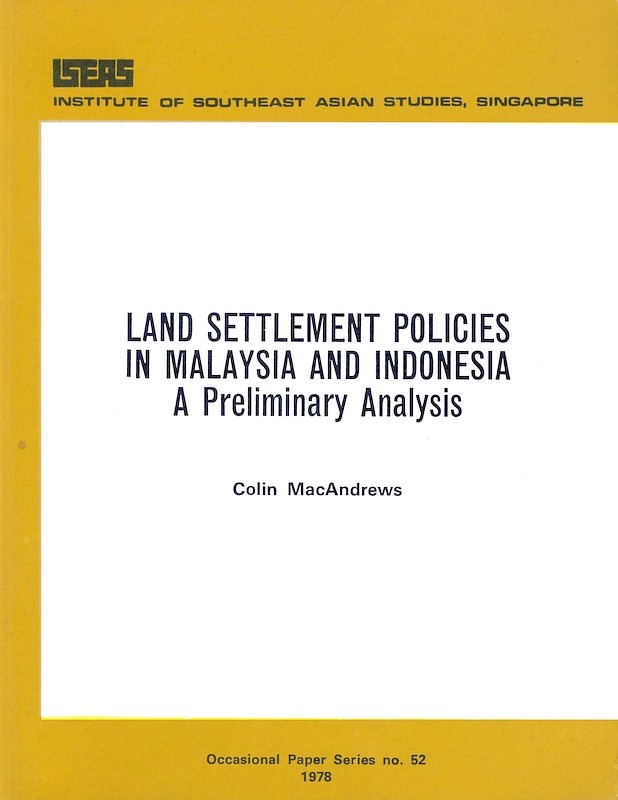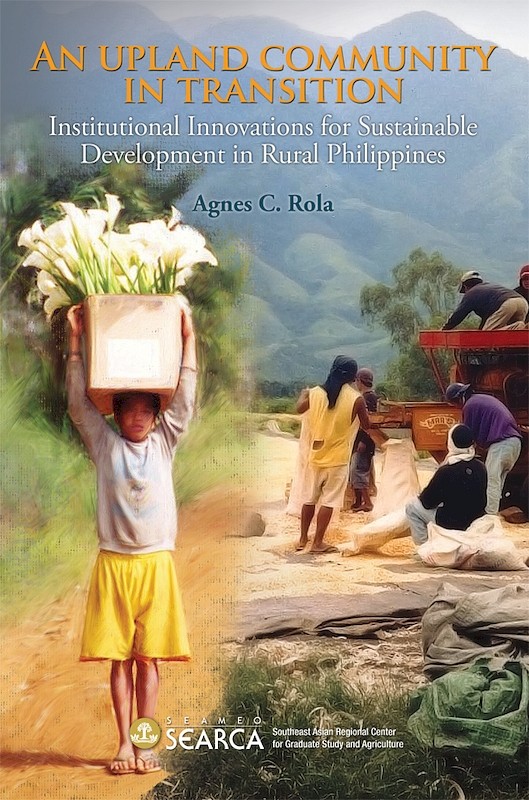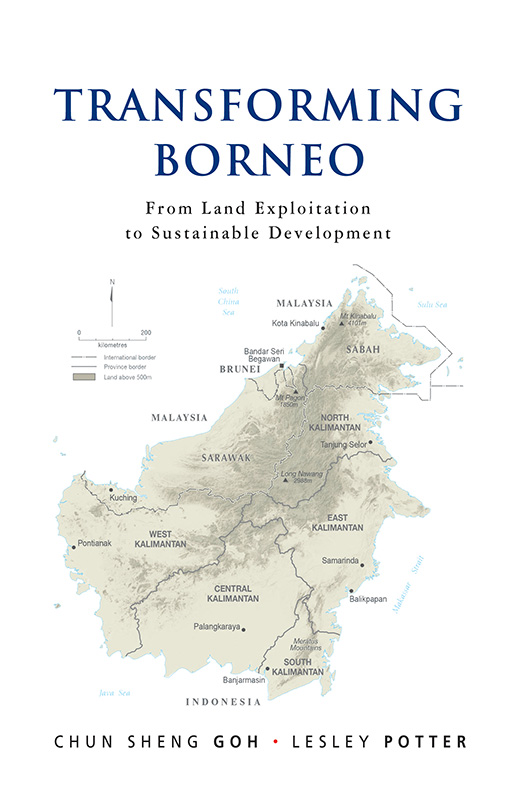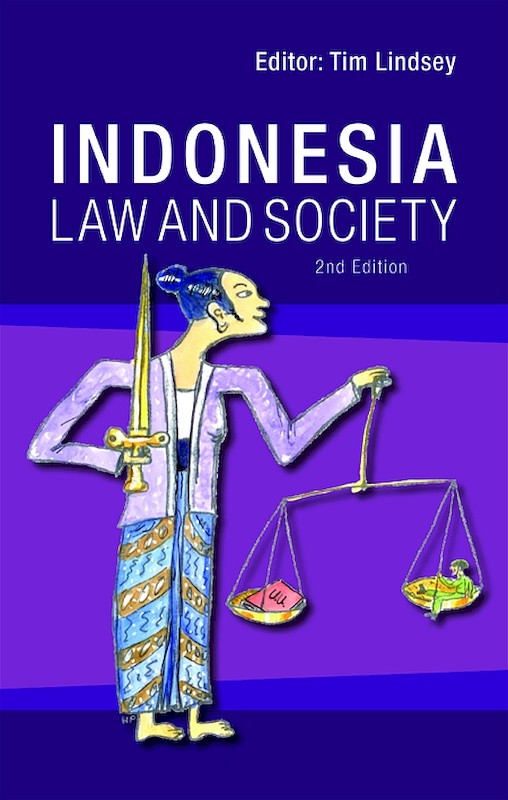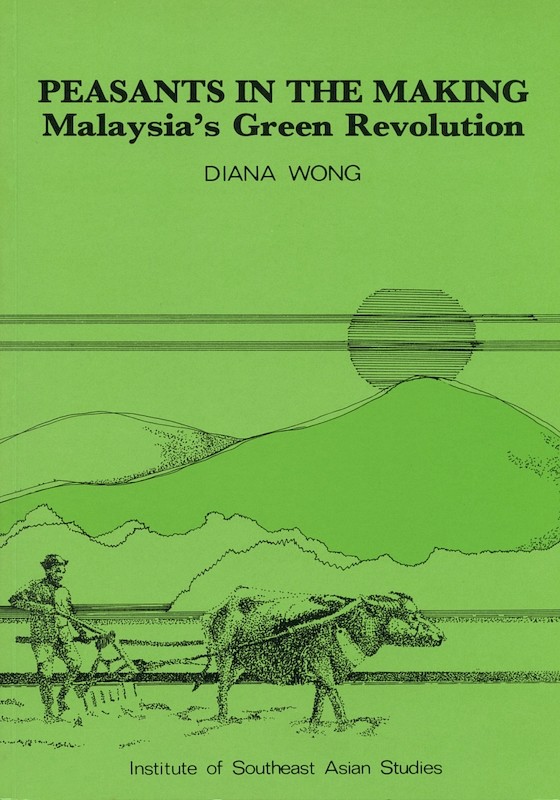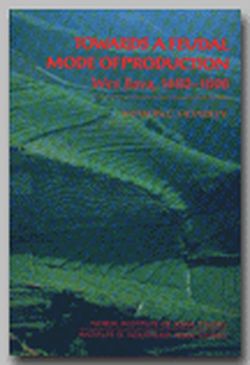Land and Development in Indonesia: Searching for the People's Sovereignty
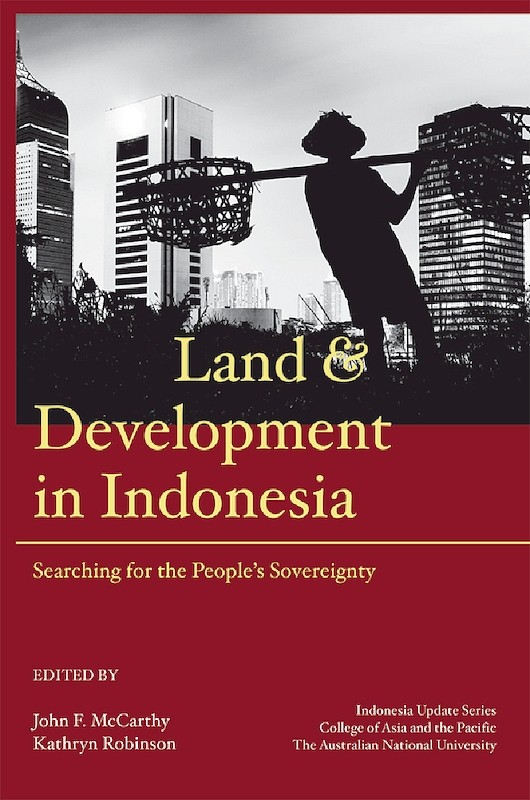
Date of publication:
2016
Publisher:
ISEAS – Yusof Ishak Institute
Number of pages:
384
Code:
BM540
Hard Cover
ISBN: 9789814762090
Soft Cover
ISBN: 9789814762083
Reviews
Ward Berenschot, Bijdragen Tot De Taal -, Land-En Volkenkunde 174 (2018) 291 - 362.
"Land and Development concerns one of Indonesia's most urgent challenges: the difficulty of ensuring that Indonesians obtain more effective control over their land. This book is part of an important book series managed by scholars at the Australian National University that has over the years brought together leading scholarship on key themes facing contemporary Indonesia. This edited volume fits that tradition well. By bringing together essays from Indonesian and international scholars with years of experience, the book's editors have provided an essential overview of the complexities of Indonesia's land governance. The book does a great job in highlighting the problems and injustices associated with land governance in Indonesia.
In short, this timely and useful book is the go-to reference for anyone who wishes to get his head around Indonesia's complex ways of dealing with land. While the book could have brought the political economy of Indonesia's land politics into sharper focus, the essays in this very useful book should spark fresh debate about how to address Indonesia's land conundrum."
Tania Murray Li, Journal of Pacific Affairs, Vol. 90:3, September 2017.
"The volume, edited by John McCarthy and Kathryn Robinson, offers powerful and richly textured insights on this complex terrain. The chapters are of uniformly high quality, which is especially admirable given the very rapid turnaround between the 2015 Indonesia update conference at the Australian National University where they were presented, and the 2016 publication. Chapters are written by noted experts, and strike a balance between overview and update. The result is a landmark volume that is both "of the moment," and destined to stand the test of time.
An overview by the editors sets the scene with a discussion of notions of sovereignty and the challenges presented by competing land uses and unequal powers. It reviews the sorry history of stalled land reform, the unresolved question of customary rights, and the tangled thicket of land law, in which scores of overlapping and contradictory regulations make land transactions expensive and insecure. It also notes the dynamic processes that are changing peoples' relations to land across the archipelago: land grabbing for plantations, population growth, migration, and the rise of global agendas stressing sustainability, climate change, human rights, and "corporate social responsibility."
Tomas Larsson. Aseasuk News No. 61, Autumn 2017.
".... This collection of papers ... provides a rather comprehensive survey of the many ways in which conflict and contestation over land shape and in turn are shaped by processes of economic development. One of the greatest strengths of the volume is that it manages to provide both a deep historical perspective and a sense where things stand today, or perhaps more accurately: where the most significant obstacles and opportunities to development could be found in 2015.
.... This is an excellent volume where anyone with an interest in either the politics of land or in the politics of development more broadly conceived in contemporary Indonesia will find a great deal of information and much to reflect over. The excellent work that is being produced on land in Indonesia should also, I would argue, inspire scholars working on other parts of Southeast Asia to pursue similar lines of inquiry - with the ultimate goal of developing an understanding of the dynamics of the land/development nexus within an explicitly comparative analytical framework."
Anne Booth. Aseasuk News No. 61, Autumn 2017.
"....The problems local people face ... made worse by the fragmentation of government responsibility across different central departments and between the centre and regional and local governments ... are addressed in the timely and informative book edited by McCarthy and Robinson, which derives from the Indonesian Update held at the Australian National University in Canberra in September 2015. The fifteen chapters cover a range of topics, from colonial era attempts to regulate land tenure to contemporary debates over changing agrarian structures, the tension between estates and smallholders, especially in the palm oil sector, and options for the protection of indigenous community rights. Although most of the papers are concerned with rural and agricultural issues, several look at urban problems including housing and infrastructure development. All the authors have extensive field experience in Indonesia, and, in most cases, combine this with useful surveys of the secondary literature."
C. Peter Timmer. Bulletin of Indonesian Economic Studies, Dec 2016.
".... As editors and authors, McCarthy and Robinson have produced a well-integrated volume in a remarkably short time (as I write, in mid-August 2016, the Indonesia Update conference at which the papers were first presented was less than a year ago.) And even in my own narrow speciality, as an analyst of food and agricultural policy in Indonesia, I learned a great deal from several of the chapters. In particular, the new empirical results from surveys sponsored by the Akatiga Foundation, in Bandung, and reported in chapter 12 by Ambarwati, Harahap, Sadoko, and White, are eye-opening. Growing inequality in land ownership among rice cultivators and increasing class polarisation in their villages are serious problems, especially in Java."
".... The book is a highly coherent collection of conference papers from the 2015 Australian National University (ANU) Indonesia Update. In an introductory essay, the editors introduce and explore key issues and unifying concepts – notably that of 'the people's sovereignty', which they describe as 'a central concept in the Indonesian political tradition', one that 'asserts human equality and sets conditions for acceptable forms of political authority ... a rhetorical resource that activists can mobilise to remind their fellow citizens of the need to address festering land issues'. This discussion nicely frames the various margins of contention explored in the book.
... the authors and editors give us a set of rich, detailed, nuanced and very readable analyses of evolving land institutions and practices at the extensive margin of development. Everyone with a deep interest in institutional dynamics, whether in Indonesia or elsewhere, will enjoy and benefit from reading this book."
About the publication
Indonesia was founded on the ideal of the "Sovereignty of the People", which suggests the pre-eminence of people's rights to access, use and control land to support their livelihoods. Yet, many questions remain unresolved. How can the state ensure access to land for agriculture and housing while also supporting land acquisition for investment in industry and infrastructure? What is to be done about indigenous rights? Do registration and titling provide solutions? Is the land reform agenda — legislated but never implemented — still relevant? How should the land questions affecting Indonesia's disappearing forests be resolved?
The contributors to this volume assess progress on these issues through case studies from across the archipelago: from large-scale land acquisitions in Papua, to asset ownership in the villages of Sulawesi and Java, to tenure conflicts associated with the oil palm and mining booms in Kalimantan, Sulawesi and Sumatra. What are the prospects for the "people's sovereignty" in regard to land?
The contributors to this volume assess progress on these issues through case studies from across the archipelago: from large-scale land acquisitions in Papua, to asset ownership in the villages of Sulawesi and Java, to tenure conflicts associated with the oil palm and mining booms in Kalimantan, Sulawesi and Sumatra. What are the prospects for the "people's sovereignty" in regard to land?
Contents
-
Land and Development in Indonesia: Searching for the People's Sovereignty
[Whole Publication, ISBN: 9789814762106], by John McCarthy, Kathryn Robinson, editors -
Preliminary pages
-
1. Land, economic development, social justice and environmental management in Indonesia: The search for the people's sovereignty , by John McCarthy, Kathryn Robinson, authors
- PART 1: LAND USE AND LAND LAW: THE BIG PICTURE
-
2. The plantation and the mine: Agrarian transformation and the remaking of land and smallholders in Indonesia , by Nancy Lee Peluso, author
-
3. Indonesian land law: Integration at last? And for whom? , by Adriaan Bedner, author
- PART 2: ENVIRONMENTAL AND CUSTOMARY FRAMING OF LAND TENURE
-
4. Emerging options for the recognition and protection of indigenous community rights in Indonesia , by Chip Fay, Ho-Ming So Denduangrudee, authors
-
5. REDD, land management and the politics of forest and land tenure reform with special reference to the case of Central Kalimantan province , by Suraya A. Afiff, author
-
6. Mining, land and community rights in Indonesia , by Kathryn Robinson, author
- PART 3: URBAN AND INFRASTRUCTURE DEVELOPMENT
-
7. Eminent domain and infrastructure under the Yudhoyono and Widodo administrations , by Jamie Seth Davidson, author
-
8. Housing low- and middle-income households: Land development and policy practice in two Indonesian cities , by Delik Hudalah, Yunie Nurhayati Rahmat, Tommy Firman, authors
-
9. Land and housing security for the urban poor , by Patrick Guiness, author
- PART 4: AGRICULTURE, LAND TENURE AND LIVELIHOODS
-
10. After 200 years, why is Indonesia's cadastral system still incomplete? , by Pierre van der Eng, author
-
11. Agrarian transformations and land reform in Indonesia , by Jeff Neilson, author
-
12. Land tenure and agrarian structure in regions of small-scale food production , by Aprilia Ambarwati, Ricky Ardian Harahap, Isono Sadoko, Ben White , authors
- PART 5: LARGE-SCALE LAND ACQUISITIONS AND SMALLHOLDER DEVELOPMENT
-
13. Industrial plantations and community rights: Conflicts and solutions , by Afrizal, Patrick Anderson, authors
-
14. How can the people's sovereignty be achieved in the oil palm sector? Is the plantation model shifting in favour of smallholders? , by Lesley Potter, author
-
15. Beyond special autonomy and customary land rights recognition: Examining land negotiations and the production of vulnerabilities in Papua , by Laksmi Adriani Savitri, Susanna Price, authors
-
Index
-
Indonesia Update Series

